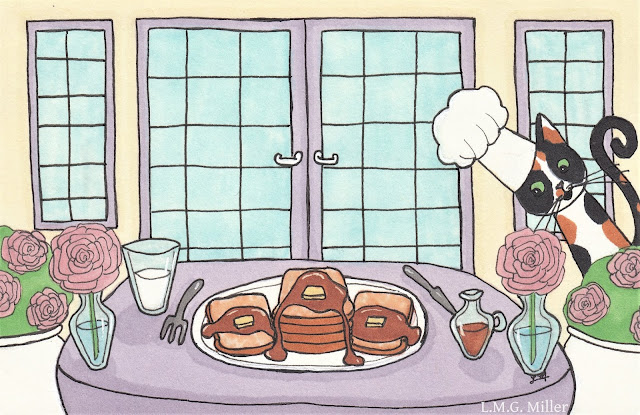Yesterday Evan showed off his toesies. Calico Tonks didn't want to be left out, so now here are her toe beans for your enjoyment.
Tonks apologizes that her face is a blur in the background there. This here human quite rudely failed to wait for her to finish bathing her pretty little self before photographing those toesies.
Have a terrific Tuesday, friends!
Today, we have the last tip in our series of heartworm tips. It's a long one, and it relates to a fact that especially all cat parents really should know. And this is that there is currently no true treatment for heartworms in cats. There are treatments available for dogs that can kill the adult heartworms, but this does not work the same for cats. One reason for this is that the drug used to treat heartworms in dogs has been found, in some cases, to cause sudden death in cats. This is often due to dead or dying heartworms causing blockages and cardiac failure. Another reason why treatments may not work is because the life cycle of a heartworm is different in a dog versus a cat.
In dogs, the lifespan of a heartworm is longer, around five to seven years. This lifespan includes larvae entering the body after a mosquito bite, traveling to the heart, and then growing into mature, reproducing adults. Dogs are an optimal host for heartworms.
In cats, the heartworm lifespan is far shorter, often two to three years. What’s more, cats are not a prime host for heartworms, and a cat’s body itself often overcomes the heartworms, typically before they can even enter into adulthood. This is why far less adult heartworms are found in cats than are found in dogs. Even immature heartworms, which are typically what would circulate in the blood and be indicative of disease in a canine heartworm test, are often not found in the blood of cats. This is why cats are less commonly diagnosed with heartworm disease. Then again, though, it is not impossible for a cat to have heartworm disease, and in this case, heartworms cannot be killed as they can in dogs.
For cats, one of the only options for a cure is to have the heartworms surgically removed. This, of course, can be tricky and risky. Symptoms of the disease can also perhaps be controlled and the cat made comfortable with various medications and supportive treatments. Given that a cat might be able to outlive the heartworms, it is possible to treat the symptoms while the heartworms go through their cycle and ultimately die. As mentioned earlier, though, heartworms can live for two to three years in a cat, and there is still always the risk of pulmonary or cardiac failure while the heartworms remain.
With such limited treatment options for heartworms in cats, it is incredibly important to again note that the best option is to keep your cats on heartworm prevention. The risk of heartworm disease might seem small, but it is a risk nonetheless. And, just as always, it is better to be safe than sorry.
And, there is one last note for pup parents. Though there is a more successful heartworm treatment for dogs, heartworm disease can cause permanent damage. This can lead to lifelong issues, such as of the heart and lungs, even after the heartworms are eradicated. For this reason, heartworm prevention is of course also recommended for dogs.



9 comments:
I like the mixed colors of your toebeans, Tonks. ~Ernie
Sweet toebeans!
The Florida Furkids
Tonks, all parts of your are adorable!
Tonks we love those great toesies of yours
Tonks is a cutie. I love the flashback. Heartworms are so awful.
Calico toesies...squeee!!!
Tonks, we love your adorable toe beans!
Tonks! your toe beans are multi colored! I, Marv, have only ever seen black and pink ones! You look marvellous darling (and we love the doodle too)
Lovely toes, and now i want French toast.
Post a Comment